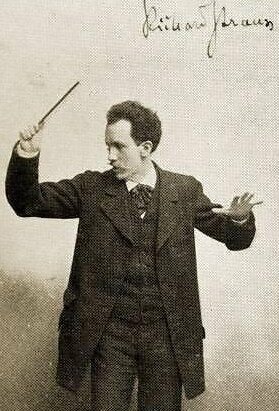 After grooming his conducting career under Hans von Bülow in Meiningen between October 1885 and April 1886, Richard Strauss was offered the post as third conductor at the Munich Hofoper. Before he took up his post in Munich, Strauss — on the recommendations of Johannes Brahms — spent several weeks touring Italy, describing various sites in a letter to his mother. In the margins he sketched tonal impressions to be used for his “first hesitant steps” into the realm of the tone poem. Strauss wrote to Bülow, “I have never really believed in inspiration through the beauty of Nature, but in the Roman ruins, I was set right, for ideas simply come flying to me. Perhaps it will interest you that on a drive on the Appian Way, one glorious afternoon, I suddenly caught myself unconsciously humming the D-major trio of the Scherzo of Beethoven’s Seventh Symphony, it expressed so completely the mood of this wonderful Campagna. I am now capable of composing works based on external inspiration.”
After grooming his conducting career under Hans von Bülow in Meiningen between October 1885 and April 1886, Richard Strauss was offered the post as third conductor at the Munich Hofoper. Before he took up his post in Munich, Strauss — on the recommendations of Johannes Brahms — spent several weeks touring Italy, describing various sites in a letter to his mother. In the margins he sketched tonal impressions to be used for his “first hesitant steps” into the realm of the tone poem. Strauss wrote to Bülow, “I have never really believed in inspiration through the beauty of Nature, but in the Roman ruins, I was set right, for ideas simply come flying to me. Perhaps it will interest you that on a drive on the Appian Way, one glorious afternoon, I suddenly caught myself unconsciously humming the D-major trio of the Scherzo of Beethoven’s Seventh Symphony, it expressed so completely the mood of this wonderful Campagna. I am now capable of composing works based on external inspiration.”
Richard Strauss: Aus Italien, “In the Campagna”
The work was first performed on 2 March 1887 at the Munich Odeon with Richard Strauss conducting. Initial reception was rather mixed, as Richard reported to his sweetheart Lotti Speyer. “Of course I found it all tremendous fun: “Eine Hetz” as they say in Vienna. Some of them applauded furiously, some of them hissed vigorously, in the end the applause won. The opposition has pronounced me half-crazy, talk about going astray and all that kind of rubbish. I felt immensely proud: the first work to have met with the opposition of the magnitude; that proves it must be of some significance.” Richard Strauss incorporated the tune of Funiculì, Funiculà into the fourth part of his symphonic poem. He assumed it was a traditional Italian folk song, when Luigi Denza in fact, wrote it in 1880. Denza filed a lawsuit against Strauss and rather predictably won.
Richard Strauss: Aus Italien, “Scenes from Neapolitan Life”
Strauss managed to secure a number of important conducting engagements in Berlin, Dresden, and Leipzig and as an assistant to Cosima Wagner in Bayreuth. Eventually he secured an appointment as Kapellmeister to the Grand Duke of Saxe-Weimar-Eisenach. Strauss’s reputation was forever transformed from a promising young assistant Kapellmeister to Germany’s most avant-garde composer by the extraordinary premiere of Don Juan on 11 November 1889. Bryan Gilliam suggests that, “the work’s provocative subject matter and musical brilliance earned him an instant international recognition as a modernist. For Mozart, Don Giovanni was a perpetual seducer, a symbol of aristocracy whose indulgences know no bounds, yet he no longer takes pleasure in his conquests. Strauss, on the other hand, saw Don Juan as a romantic hero and adventurer hopelessly searching for the ideal woman.
Richard Strauss: Don Juan, Op. 20
Strauss’s engagement with tone poetry none withstanding, he also began to probe the relationship between text and music. By the late 1890’s, he had not only composed several hundred songs, but also completed a melodrama for narrator and piano. Enoch Arden, based on an 1864 poem by Alfred, Lord Tennyson consists of brief interludes and moments of punctuation and commentary. Although popular during its day, this kind of dramatic presentation with musical accompaniment, together with recitations and declamations quickly fell out of fashion.
Richard Strauss: Enoch Arden, Op. 38
You May Also Like
- Richard Strauss: Horn Concerto No. 2
Premiered Today in 1943 In his day, Franz Strauss was recognized as an important artistic personality. - Strauss: Die Schweigsame Frau (The Silent Woman)
Premiered Today in 1935 Richard Strauss’ Die Schweigsame Frau might be the only opera in the entire oeuvre - Strauss: Four Last Songs
Premiered Today in 1950 Richard Strauss had reached the ripe old age of 84 when he decided - Minors of the Majors
Richard Strauss: Macbeth, Op. 23 Richard Strauss’s monumental tone poems are the central musical expressions of the Austro-German tradition at the turn of the century.
More Inspiration
- Smetana’s Musical Postcards
The Albumblätter of a Young Romantic Music composed for his wife, friends and students! - All Kinds of Elfen Kings: Schubert’s Erlkönig Transformed Explore the many faces of Schubert's 'Erlkönig' from solo violin to full orchestra
- Becoming Music: Nielsen’s Pan og Syrinx Explore his masterful eight-minute musical storytelling!
- Claude Debussy’s Saint Sebastian
A Musical Journey from Stage to Symphony Discover Debussy's hidden orchestral gem!
